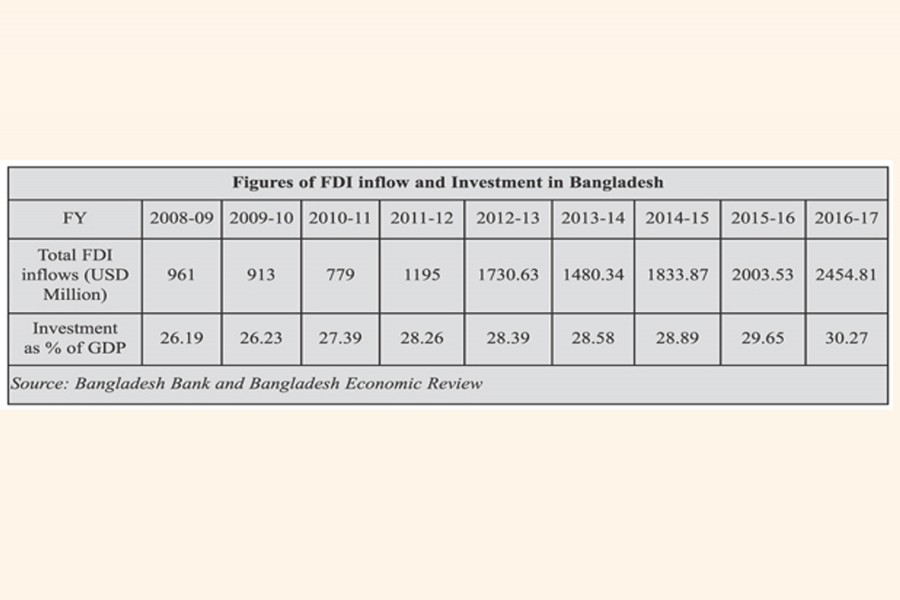The flow of foreign direct investment (FDI) into Bangladesh dates back to 1984 soon after enactment of the 1980 Foreign Private Investment Act. FDI is a major source of capital formation and a mechanism aiding knowledge transfer. There arises a question as to why we are not doing well despite a stable exchange rate and inflation remaining at the acceptable level. The popular opinion is that we failed to entice foreign investors and our FDI inflow, an important catalyst of economic growth, is quite small due to the lack of an enabling environment. The indication is that the more the FDI inflow is, the better the investment growth scenario will be. Again the question remains: Is the FDI an unmixed blessing or not?
The impact of FDI on economic growth is an exceedingly disputed subject among the academia. Some connoisseurs of modernisation theory opines in favour of FDI and recommend capital formation to generate employment and ensure transfer of knowledge and technology. FDI has a major role to play in developing countries. On the contrary, some experts of dependency theory specify that FDI might have a downbeat impact on economic development of the beneficiary country. The expatriation of earnings by foreign firms jeopardises the beneficiary country's balance of payments. Again, brisk inflow of foreign currency through FDI might lead to the 'Dutch Disease' phenomenon in an economy causing currency appreciation, making the country's other products less price competitive in the export markets. FDI could have a good impact, if Bangladesh has the adaptation capability in terms of education, technology, infrastructure, human capacity, and political stability.
According to the International Monetary Fund (IMF), FDI refers to investments made to acquire a lasting interest in enterprises operating outside the economy of the investor. According to OECD, "A foreign direct investment enterprise is an enterprise resident in one economy, and in which an investor resident in another economy owns, either directly or indirectly, 10 per cent or more of its voting power, if it is incorporated or the equivalent for an unincorporated enterprise..." The components of FDI are: a) Equity capital, b) Reinvested earnings and c) Intra-company loans. It is one of the major components of private sector investment.
Bangladesh enters the club of top 100 countries of the world's most competitive economies, according to the Global Competitiveness Index (GCI) 2017-18 released by the World Economic Forum (WEF). The country moved seven notches up and ranked 99th among 137 countries in the annual index. The country scores 3.5 out of maximum 6.0 points in the Country Policy and Institutional Assessment (CPIA) of the WB. Developing countries' average point is 3.3 (Bangladesh scores 0.2 per cent higher). Bangladesh received $2.65 billion in gross inflows of FDI between July 2016 and May 2017, whereas the amount was $2.33 billion in the same period of the previous year. Bangladesh was positioned 177th among 190 economies in the Doing Business ranking. All are positive figures for the country, though the rate of progression is slow.
Total investment in the FY 2016-17 was 30 per cent of GDP which helped achieve the GDP growth rate of more than 7.0 per cent. The 7th Five-Year Plan postulates investment on a yearly average of 24.7 per cent of the GDP from the private sector during the period. To achieve the Vision 2041 to be a developed country the growth rate has to be about 9.0%.
FDI is not an unmixed blessing. Foreign investment could extensively brighten the growth scenario of Bangladesh, provided the growth is inclusive and the governance situation and the characteristics of the corporate sector are conducive. With the increase in FDI, the current account balance (CAB) will decrease. FDI is about trust and confidence in the economy, and to attract it, we need an FDI strategy under the umbrella of our development strategy. Geographic location, consumer market and low labour costs attract FDI into a country despite the deficiencies in physical infrastructure, energy, poor governance, low score in the ease of doing business etc. But we also need to look into the human, institutional and social aspects of development as well.
The existing policy issues to encourage FDl are tax exemptions, duty-free imports and full repatriation of profits and invested capital. Policies should be directed to attract FDI inflows into diverse sectors without compromising the environmental guiding principle.


